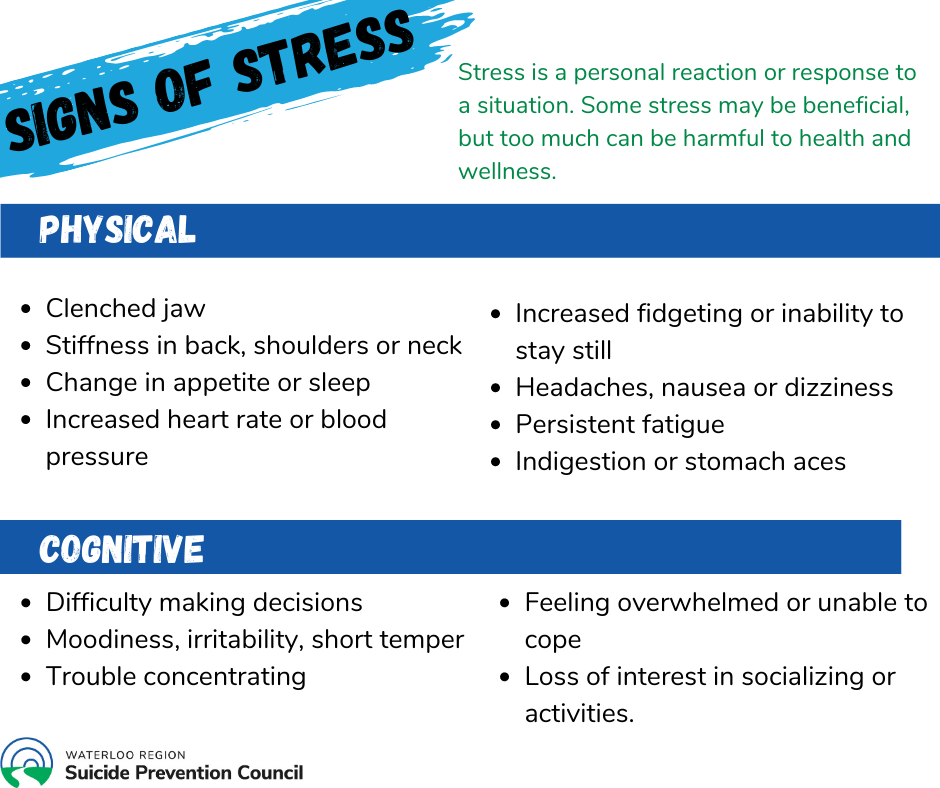Stress: What is it, and How Can We Manage it?
In 2017, as part of an identified strategy, the Waterloo Region Suicide Prevention Council underwent a project to collect stress, life promotion, and resiliency resources from across the web. This information collected about stress is now included here, in an updated and edited blog post.
What is Stress?
Stress is an individual and personal response to a situation. Individuals may have different stress responses, different stress thresholds, and different signs of stress. The stress response may also vary within an individual day by day – what may not cause stress on one day may cause stress on another, depending on context and the presence of other stressors or resilience factors. For example, on a typical day coming home to dirty dishes may not be a stressor for you. However, if you’ve had a busy day at work and come home feeling exhausted, that same situation of coming home to dirty dishes may cause stress.
Stress can be beneficial and some researchers, such as Kelly McGonigal, Ph.D. in her book “The Upside of Stress: Why Stress Is Good for You, and How to Get Good at It” argue that stress can have positive benefits. For example, stress may make us more alert or productive. However other research shows that too much stress or chronic stress can lead to consequences such as poor physical and mental health (See this page of the American Psychological Association for more information on the effects of stress on our body). The stress threshold for when beneficial stress becomes harmful stress will differ person by person and day by day.
It is important for us all to learn to recognize what our signs or stress are – often we may not recognize we are stressed until that stress culminates in a short temper and irritation towards friends or family members, or body pains and headaches that seemingly “come from nowhere”. Often these signs tell us we have been experiencing stress and may need to focus on reducing that stress to improve physical and mental health.
While signs of stress differ as stress is an individual response, here are some common signs of stress you may experience.

How can I cope with stress?
Stress is a part of life. Everyone at one time or another will experience stress, and the way we know we’re stressed can be different for each of us. Sometimes a stressful thing won’t last long- we may problem-solve, reach out to supports, or find a way to cope. At other times, a stressful situation can last longer and affect our ability to live our life the way we normally would. It’s during these times that it’s important to explore different t ways that can help us manage and overcome stressful situations (American Psychological Association).
Some examples of ways you may be able to manage stress are:
- Addressing the source of stress directly (for example, reducing hours at work if you are able to or removing email notifications from your phone).
- Establishing a healthy and manageable routine- this can reduce unpredictability, the mental load of decision making, and can help you to engage in positive coping strategies such as exercise, engaging in hobbies, or socializing with others.
- Being honest with your support system about the stress you are experiencing and ask for help if needed.
Resources for Further Learning
Below are some web-based resources with further information and resources on stress & how to handle stress in your life.
How do you Know You’re Stressed? – American Institute of Stress
Stress can affect both our emotional and physical health. Learn how to recognize the signs of stress and what to do about it.
Stress in Your Everyday Life – American Psychological Association
Stressful situations can range from short-lived and easily managed to lengthy more serious situations. Recognizing our stress level and learning how to manage it will lead to a healthier happier life.
Workplace Stress– Helpguide.org
Coping with stress in the workplace can be a challenge at times. Some workplace stress is normal, but too much stress can affect how well we are doing at our job. Learning about the signs of stress at work and tips for relieving stress can lead to a more fulfilling work life.
Stress at different Stages of Life – Centre for Studies on Human Stress
Young people, Parents, Elders, and Workers experience stress for different reasons. At every age, there are different ways to cope with stress.
Coping with Stress (Parents, Kids and Teens, and Educators) – Centers for Disease Control
Healthy coping strategies look different for kids and teens than they do for parents and even teachers. Plans to manage our stress should be matched with our individual situations.

